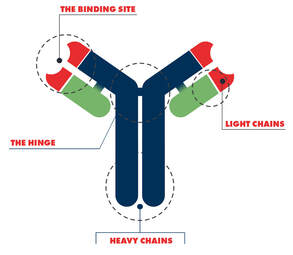|
The immune system is the human body's extremely powerful reaction system that thwarts bodily invaders like germs, viruses, and bacteria. Usually, it does wonders to fight dangerous infections and diseases with reactions like swelling and fever — however, it can sometimes mistake harmless objects for truly threatening ones, causing an allergic reaction to occur.
While almost anything can trigger an allergic reaction, from dust mites to pollen, one of the most common causes is a specific type of food, most commonly peanuts, tree nuts, and shellfish. It is estimated that about 4-6% of Americans have a type of food allergy, and for some, dietary restrictions can make it extremely difficult to find a proper meal. Today, we're going to investigate more closely the relationship between food allergies and the immune system. You may already be familiar with what an antibody is — a Y-shaped protein in the blood that can bond to a specific kind of particle in order to neutralize it by impeding it from functioning or by allowing another immune system cell to swallow it. These immunoglobulins are usually used to fight harmful pathogens — however, for people with food allergies, antibodies (called IgE in this case) develop in order to "fight" innocuous food particles. When this bonding occurs between the allergen and the IgE, mast cells release a hormone called histamine that causes allergic symptoms like itching, sneezing, swelling, and a runny nose that normally fight dangerous bacteria but are now unleashed against something as harmless as a walnut. Surprisingly, allergies occur more often in those who have primary immunodeficiencies, or a sub-optimally performing immune system. Because PIs often only affect a part of the immune system, the rest of the system will not be regulated as well and bad reactions can be exaggerated due to the lack of control and stability within the body. Additionally, exposure to bacteria as well as the medication to fight them can negatively affect the immune system as a whole and worsen the reactions as well. PIs and food allergies could also share a specific genetic cause, making them inherently interlinked. This can also make it more difficult to identify the cause behind certain symptoms — is my runny nose due to an allergy, a cold, a weak immune system, or all three? Even medical professionals can be confused by the variety of interrelated symptoms and infections that may result from an assortment of immune system issues, from allergies to a PI. Scientific and medical research continues to investigate these relationships and the complex causes behind food allergies. If you think you may be suffering from a food allergy, we recommend keeping an eye out for any possible clues, but don't be too quick to diagnose yourself — always go to a medical professional first if you have any questions or doubts. Happy early Thanksgiving from us to you at Nourish America! By Michelle Liu
1 Comment
Leave a Reply. |
Details
Archives
May 2021
Categories |
Powered by
 Create your own unique website with customizable templates.
Create your own unique website with customizable templates.
 Create your own unique website with customizable templates.
Create your own unique website with customizable templates.



 RSS Feed
RSS Feed